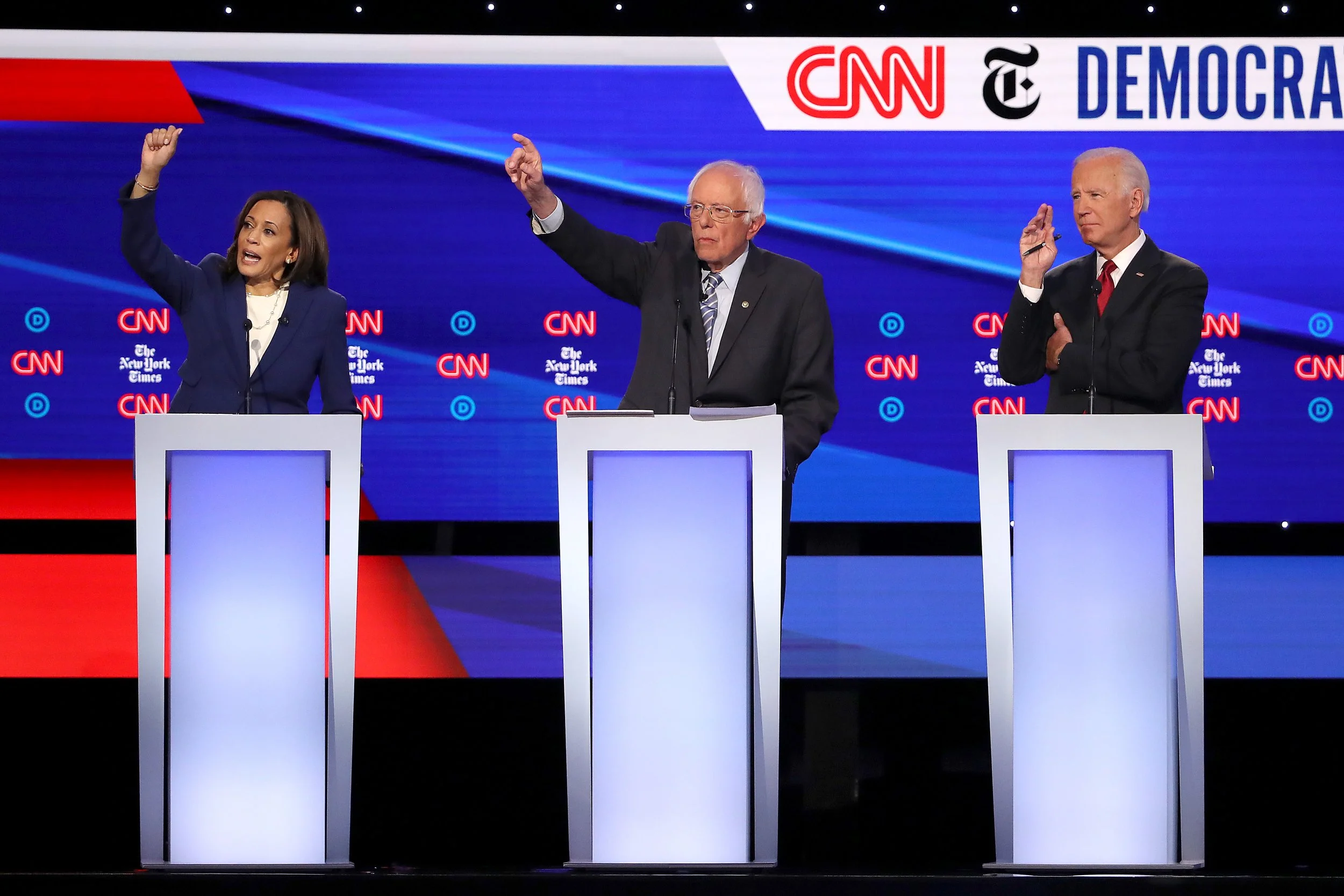OPINION: Embrace civility in casual debate
“Vice President Kamala Harris, Sen. Bernie Sanders and President Joe Biden raise their hands during the Democratic Presidential Debate on Oct. 15.” Photo by Win McNamee via Getty Images.
Danny Murnin is a sophomore studying journalism and an opinion writer for The New Political.
Please note that these views and opinions do not reflect those of The New Political.
Most people on my side of the political spectrum may disagree with this, but it is shortsighted to judge people directly on their political and sociocultural views, with a select few exceptions.
According to a May 2021 survey from the American Enterprise Institute, just 32% of Democrats (including myself) report having Republican friends. Meanwhile, a solid 53% of Republicans report having Democratic friends. Everyone is entitled to their own opinions, but it pains me when friends of mine express views that I know are misinformed and wrong.
At the end of the day, as long as the people I consider friends treat me as such, don’t hold downright bigoted views and are decent and respectful people, I don’t care whom they may vote for. It really is that simple.
The problem, however, is that it is getting harder for this to remain simple. There are far too many people on the far left and far right who believe that the establishment factions on both sides are really not that different from each other. Many on both sides of the extreme believe the two often work in cahoots to continue some devious scheme to hurt everyday people, particularly those with little representation in the government.
Their goal is to pull the establishment of the wing they most identify with further from the center, and they do it in two main ways: starting useless culture wars over meaningless hot topics and using increasingly cruel language to describe the views of the other side on more mainstream issues.
In this first way, it is almost exclusively conservatives at fault. Popular far-right media personalities such as Tucker Carlson, Matt Walsh and Ben Shapiro spend a lot of time raging against concepts such as Critical Race Theory (CRT) and gender ideology. In a nutshell, their (false) argument is that these two topics are being widely taught to young public school children to indoctrinate them into supporting the Democratic Party. These commentators believe the current Republican Party establishment is not acting fast enough against major sociocultural changes taking place in America that will damage institutions and standards that conservatives tend to support.
Most of the time, wide conservative outrage is performative and fails to have much impact. However, this war they are waging against what they see as an attempt to turn America into a bastion of leftist beliefs is different. States like Texas and Florida have implemented strict restrictions on what can be taught about race and gender in the classroom. In my own school district back home outside of St. Louis, Missouri, the level of vitriol directed by right-leaning and left-leaning parents toward each other in the spring of 2021 in a debate over whether CRT was part of the district curriculum shocked me. Things have only gotten nastier there since.
When it comes to debating more mainstream issues, however, liberals share a lot of the blame for the gradual turn toward incivility in discussion. The amount of labeling liberals direct toward conservatives on various prominent topics is concerning.
If someone opposed non-peaceful protests against police brutality in the summer of 2020, they were considered racist. If someone is anti-abortion, then they don’t want women to have rights. If they oppose forms of gun control, then they support mass shootings. If someone thinks transgender people should have to wait until a certain age to get gender-affirming surgery, then they hate transgender people.
I could go on and on, but the point is made. Although I don’t actually disagree with some of the more common labels launched by those on my side of the spectrum, it isn’t a healthy thing to do when working toward a cause, and it definitely isn’t a good idea to use them in casual debates with friends, acquaintances, or even family members.
Considering the new free speech policy at Ohio University, students should be encourages to participate in public discourse. People are entitled to their views, as long as they aren’t actively harmful, so it isn’t right to hold that against someone. One can decide to weaken or even cut off their relationship with that person, but what will that accomplish? Civil debate is healthy. Our country is better when we encourage civil discussion among groups of people with varying opinions and who may not always agree.
If our country continues this gradual climb toward unbreakable division and no bipartisan relationships, the consequences could be dire. Countless pieces have been written by older, more idealistic commentators surrounded by politics in major publications about this subject, but as a younger person, the firsthand solution starts with this generation.

